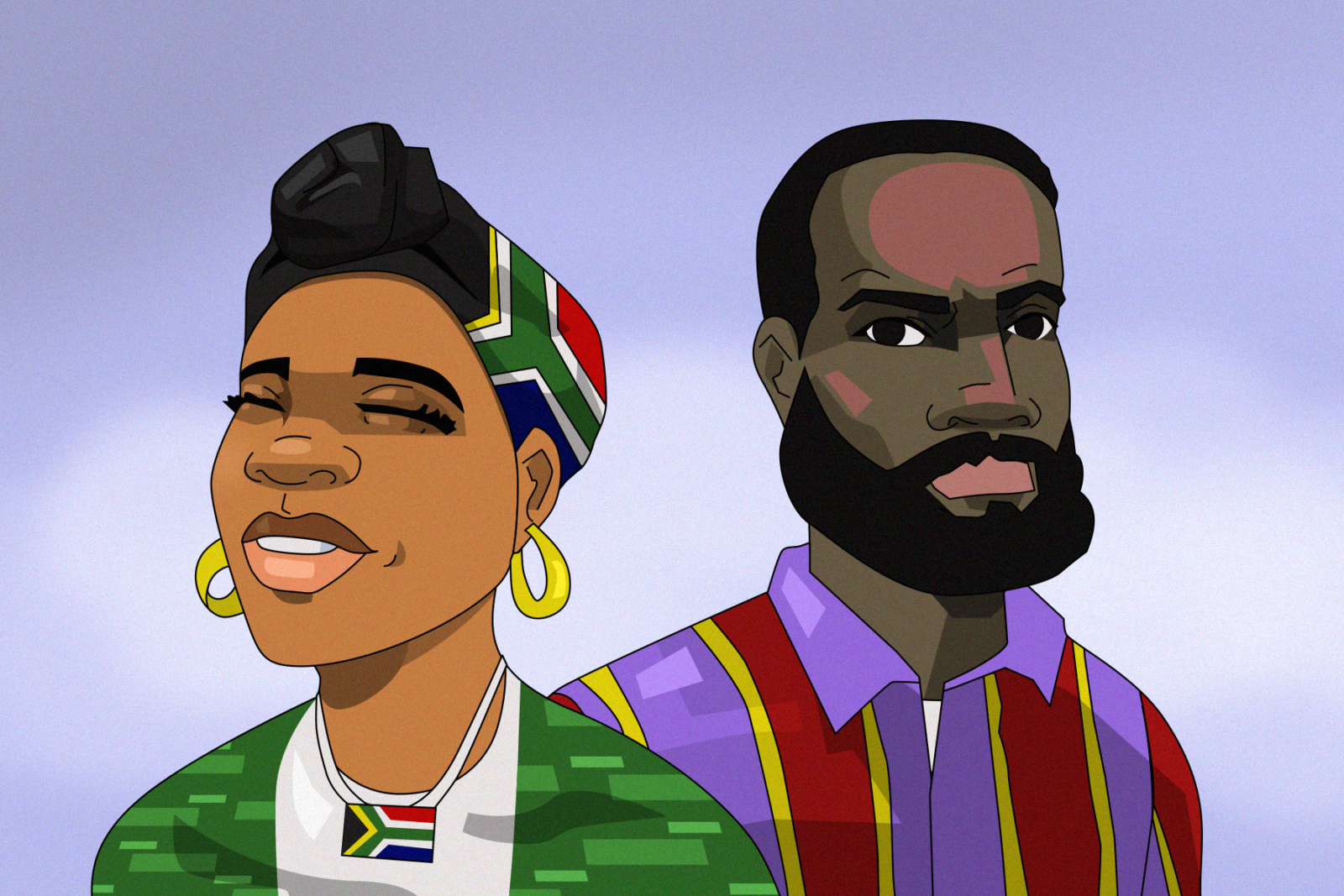“[It exposes us] to more hate,”: Mixed feelings trail South Africa’s migrant ‘inclusive’ census
- South Africa is counting undocumented migrants and asylum seekers for the first time in its ongoing 2022 census but reactions to this are split between optimism and concern.

Image description: In the illustration, a woman (Left) in a green and white Nigerian football jersey and a headwrap with colours from the South African flag wears a radiant smile. She is wearing gold earrings and a necklace with the South African flag as a pendant. Behind her is a man dressed in a shirt in the colors of the flag of the Democratic Republic of Congo. He is bearded and looks skeptical.”
Johannesburg, South Africa (Minority Africa) — In the small restaurant she runs in Johannesburg, 38-year-old Chioma Eke* offers customers local Nigerian food. The menu is a wide array: egusi soup, pepper soup, okra soup and fried rice. Yet, despite the loyal customer base she has built, Eke is an asylum seeker from Nigeria and this status has stalled the progress of her business.
Eke is occasionally harassed by the police for her status – a string of events that has also affected her client base, many of whom are undocumented and asylum seekers like herself and would rather not have run-ins with the police.
Earlier in February, the South African census began. It is a notable one because the government announced that undocumented migrants and asylum seekers would be counted for the first time, a decision that has garnered different reactions.
For Eke who came to South Africa in 2004 chasing a better life, this announcement and its implementation could potentially open up a door of opportunities for her and her business.
“[It] is a milestone for me as a foreigner,” she says. “Migrants always struggle to access healthcare services; they struggle to have their children accessing government schools where education is for free.”
“[Counting us] will give the government officials accurate figures about the number of migrants in the country,” she adds. “With time, we will be included in accessing these services because they will plan everything with us in mind as well.”
Besides access to social services, Eke is hopeful that being counted will also reduce the intensity and frequency of xenophobia that foreigners experience in South Africa.
The Institute for Security Studies Protest and Public Violence Monitor has recorded 241 xenophobic attacks and related incidents in the eight years from January 2013 to March 2021. Their data shows that 58 of the 241 incidents (24%) occurred in the past 12 months alone, although the actual number is likely higher because only attacks reported by the media are captured.
In recent months, The Dudula Movement — a vigilante organization that targets ‘illegal’ foreign nationals, accusing them of taking jobs from locals and deploying violent methods to evict them — has gained ground in the country.
“We have seen how some politicians and activists fuel hate between the locals and migrants through giving incorrect figures on the number of migrants living in the country. They use the wrong figures to garner votes and relevance in their political activities,” Eke says.
“At least now if migrants are counted the locals will know the correct number of migrants living with them and they won’t be lied to or used by activists to feed into their political schemes,” she adds.
Grace Matondo*, an undocumented migrant from the Democratic Republic of Congo does not share Eke’s viewpoint and instead expresses skepticism on the census programme.
“I wonder why the South African government is doing all this; exposing migrants to more hate and targeting by the extremists in the country,” Matondo who is a fish-and-vegetable vendor tells Minority Africa.
“With the amount of hatred that has been perpetrated by some sections of South African citizens, I’m sure they are against this move of counting migrants. I am sure the government will not be able to defend this when extremists start challenging them,” she says.
Matondo who witnessed “Operation Dudula” recently has a feeling that the groups who perpetrated xenophobic violence will weaponize data from the census against foreigners.
“They will wake up one day and use this data against us. I have fears this will happen,” she says. “Counting migrants will work against us and trap us into facing more persecution from these far-right groups.”
But Sharon Ekambaram, a Refugee Migrant Rights Manager at Lawyers for Human Rights, an organization working to give legal representation to marginalized and vulnerable communities, believes this data can be beneficial.
“We need disaggregated data which includes information on international migration to debunk the myth that South Africa is flooded with undocumented foreign nationals or just the numbers of foreign nationals in our country,” she says.
Ekambaram also adds that it is necessary to insulate migrants from possible backlash and violence and have that data as confidential as possible even as it is used in policy design.
“Disaggregated statistics on both international migration and internal migration and a proper breakdown of the numbers of people is critical to ensure that the government is making informed decisions with respect to budgeting and provision of services including health care, education, delivery of basic services,” she says.
Her perspective is echoed in many conversations around migration and the census and is in part bolstered by the developments from the 1996 census during which Black South Africans and other migrants in the country were counted for the first time as citizens of a democracy.
Amando Dlakama, a Mozambican migrant who had fled civil war in his home country to live in South Africa in 1988, was among those counted in 1996. 66-year-old Dlakama — only 40 at the time — notes being recorded in that census as a turning point in his life.
“[It] made that huge difference as our livelihoods as migrants changed for the better,” he tells Minority Africa. “People were documented [and] were allowed access to many things.”
Dlakama received his permanent residency status after the first census of 1996.
“We used to survive through piecemeal jobs, but after the census and getting documents I took a license and got a job as a driver, so there is always hope in everything,” he says. “I believe the government is on the correct path and after this census, something meaningful will come out for migrants, either documented or not.”
Regardless of these perspectives and criticism around how the census has also excluded LGBTQ+ people, the ongoing census is scheduled to run up to the 20th of March and with a possibility of extension.
“We need to give the programme a chance,” says Rufaro Tinashe*, an undocumented Zimbabwean national. “Everything, in terms of planning and implementing, starts from having the correct figures. I want the government to use the outcomes of counting to develop the country and correct those thriving on fake news and misinformation.”
Tinashe is resolute in their belief that the census can work, as is Trevor Oosterwyk, Director for Corporate Communications for Statistics South Africa, the body organizing and implementing the census.
“People who are in South Africa illegally have no papers, but we need them to plan as a government,” Oosterwyk says. “We will keep this information confidential, they must not shy away.”
*Some names have been changed to protect identities.
Mkhululi Chimoio is a Zimbabwean-born investigative journalist residing in South Africa. He is a full member of the Southern Africa Freelancers Association (SAFREA) and holds a qualification in Communication Science, another qualification in Journalism and Media studies, as well as in Forensic investigations.





